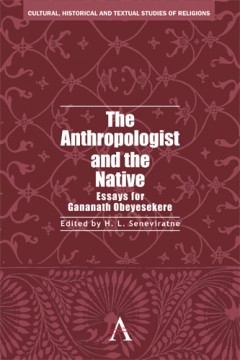The Anthropologist and the Native
Essays for Gananath Obeyesekere
Edited by H. L. Seneviratne
Cultural, Historical and Textual Studies of South Asian Religions
Other Formats Available:
E-Book- About This Book
- Reviews
- Author Information
- Series
- Table of Contents
- Links
- Podcasts
About This Book
‘The Anthropologist and the Native’ is a collection of twenty essays by internationally known scholars of different persuasions, honouring the distinguished anthropologist Gananath Obeyesekere, Professor Emeritus at Princeton University. Obeyesekere’s writings include ‘Land Tenure in Village Ceylon’, ‘Medusa’s Hair’, ‘The Cult of the Goddess Pattini’, ‘Work of Culture’, ‘The Apotheosis of Captain Cook’, ‘Imagining Karma’, ‘Cannibal Talk’, (with Richard Gombrich) ‘Buddhism Transformed’, and the forthcoming ‘The Awakened Ones’. Professor Obeyesekere’s contribution to South Asian studies and to anthropology is vast, and the rich variety of topics and approaches that marks this volume reflects his wide-ranging interests, constituting an apt tribute to his voluminous and inspiring work.
The authors featured in this collection are internationally known scholars from a variety of disciplines, including literary and textual studies, Indology, religion, history, social theory, art and anthropology. Reflecting Obeyesekere’s wide interests, the volume is arranged into six sections dealing with the Indian tradition and its representation; caste, kinship, land and community; renunciation and power; Buddhism transformed; the enigma of the text; and lastly a section entitled ‘The Anthropologist and the Native’, a discussion of aspects of anthropological fieldwork that evokes Obeyesekere’s extensive and intensive work dealing with his own society of Sri Lanka.
Reviews
Author Information
H. L. Seneviratne is Professor of Anthropology at the University of Virginia.
Series
Cultural, Historical and Textual Studies of South Asian Religions
Anthem South Asian Studies
Table of Contents
Editor’s Note; Section 1: The Indian Tradition and its Representation; 1. Paratha Mitter, Language and Race in Colonial Representations of Indian Society and Culture; 2. John Nemec, When the ‘Parampara’ Breaks: On Gurus and Students in the Mahabharata; 3. Patrick Olivelle, The Living and the Dead: Ideology and Social Dynamics of Ancestral Commemoration in India; 4. David Shulman, On Singularity: What Sanskrit Poeticians Believe to be Real; Section 2: Caste, Kinship, Land and Community; 5. Lawrence A. Babb, Recasting a Caste: The Case of the Dadhic Brahmans; 6. James Brow, Reconstituting Village Communities: Sir William Gregory’s Efforts to Renovate Village Agriculture in Ceylon’s North Central Province; 7. Dennis McGilvray, Dowry in Batticaloa: The Historical Transformation of a Matrilineal Property System; Section 3: Renunciation and Power; 8. Arjun Appadurai, The Morality of Refusal; 9. H. L. Seneviratne, Revolt in the Temple: Politics of a Paintings Project in Sri Lanka; 10. Peter Van der Veer, Pain and Power: Reflections on Ascetic Agency; Section 4: Buddhism Transformed; 11. Anne M. Blackburn, ‘Buddhist Revival’ and the ‘Work of Culture’ in 19th-century Lanka; 12. Steven Kemper, Dharmapala’s Buddhisms; 13. Donald K. Swearer, Religion and Globalization from the Historical Perspective of Thai Buddhism; Section 5: The Enigma of the Text; 14. Wendy Doniger, The Mythology of the ‘Kamasutra’; 15. Malalgoda Kitsiri Malalgoda, ‘Mandarampura Puvata’: An Apocryphal Buddhist Chronicle; 16. Romila Thapar, Variants as Historical Statements: The ‘Rama-Katha’ in Early India; Section 6: The Anthropologist and the Native; 17. Arjun Guneratne, Plain Tales from the Field: Reflections on Fieldwork in Three Cultures; 18. Abdelmajid Hannoum, The (Re)Turn of the Native: Ethnography, Anthropology, and Nativism; 19. R. L. Stirrat and Dinah Rajak, Romance of the Field; 20. Mark Whitaker, Human Rights and ‘Practical Rationality’ among Sri Lankan Tamils and Americans
Links
Stay Updated
Information
Latest Tweets



